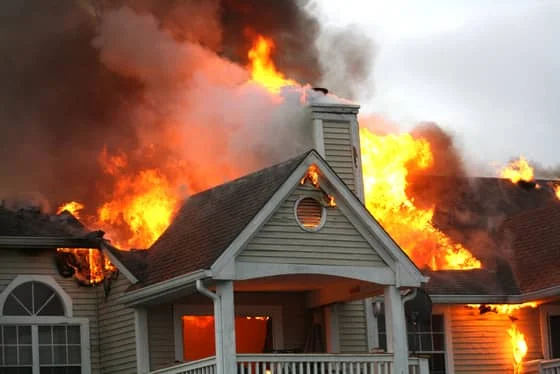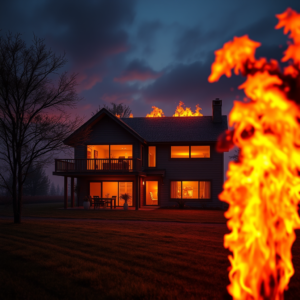How Most House Fires Ignite and Where They Begin
Did you know how do house fires start at night and spread before you even realize it? It’s a scary thought for everyone, but especially homeowners, safety experts, and parents, learning why house fires occur is extremely important. It is one of the many facts out there to learn for the purpose of protecting homes and family members.
House fires happen more often than you might think. The National Fire Protection Association (NFPA) estimates that approximately 350,000 house fires occur each year in the U.S. alone! Such fires can cause great devastation in terms of property as well as lives. However, optimism is in order, because being familiar with the common locations of such fires can considerably mitigate the threat.
In this blog, We will explore the common reasons and locations associated with house fires, provide some recommendations in maintaining the security of your house and what measures to employ in case a fire outbreak occurs. Stay with us to get all the info you need!
Common Causes of House Fires
-
Cooking Equipment
Unattended cooking equipment is one of the leading causes of house fires. From leftover pots on the stove to various kitchen utensils that do not work well, the kitchen is arguably the most prone area for fire risk. If not taken care of, grease fires can start rapidly and spread quickly. Therefore, caution must be exercised at all times during meal preparation, and the kitchen should not be left unattended whenever the gas or oven is switched on.
Keeping appliances in the kitchen in good working order helps to forestall any electrical mechanical failures which may potentially cause a fire. Understanding how do house fires start at night is essential. A clean and easy-to-maintain surface of cooktops and ovens will help to minimize the grease lock fire hazards. Installing a smoke detector in the kitchen area can provide an early warning, alerting you to potential dangers before they become unmanageable.
-
Heating Appliances
Heating equipment such as space heaters, fireplaces, and furnaces are another common cause of house fires. In winter periods, improper heating devices or their malfunctioning can impose serious hazards. Operate the space heater at least thrее feet away from combustible materials and don’t leave the space flamе hеatеr unattended.
Frequent checking of the heat appliances can assist in discovering and correcting issues that may cause a fire, beforehand. Soot and other materials that occasion fire must be cleaned out from the chimney once in every year. Fire screens in front of the fireplaces to prevent the spilling over of flames, and storing flammable materials from the heating devices are very important aspects of fire safety.
-
Electrical Malfunctions
Electrical malfunctions are a leading cause of house fires, often occurring at night when the household is less likely to notice an issue immediately. Wires that are wrongly connected, too many devices plugged into one outlet, and too badly used wires are common fire causes. Conducting regular assessment and evaluation by a professional electrician can pinpoint problems and correct any electrical hazards before they occur.
Also, it is wise not to fill power strips to capacity and it is advisable to turn off appliances that are not in use. Use intact electrical cords, and avoid running them under carpets or through doors to prevent structural damage. Regular use of GFCI devices in places such as cookhouses and restrooms where disaster possibilities are high could help improve safety from electrical fires.
-
Candles and Open Flames
Candles add warmth and ambiance to any room, but if left unattended, they can quickly become a fire hazard. It’s crucial to understand how do house fires start at night, particularly with candle use. Ensure that candles are fixed on surfaces that are not easily tipped over and away from combustible objects such as draped fabrics and sheaves of papers. Make sure that you blow off the flames in the candles before walking out of the room and or sleeping.
Consider using flameless candles as a safer alternative. If you do use traditional candles, ensure they are in holders that prevent tipping and have a protective rim. Keep candles away from children and pets, and don’t place them near open windows where they could be knocked over and ignite nearby objects.
-
Children Playing with Fire
If children are not educated about fire safety, their inherent curiosity about flames may result in hazardous situations. It’s important to keep everyday items like matches, lighters, and other devices that create flames out of their reach and sight. Educating children about the dangers of fire and teaching them what to do in case of a fire emergency is crucial for their safety.
Engage children in conversations about fire safety and involve them in creating an escape plan for the home. Reiterate the dangers of fire and playing with it, and ensure they know how to contact emergency services if needed. Using suitable learning materials is essential for imparting knowledge about fire safety to children, particularly focusing on how do house fires start at night.
Where Do Most House Fires Start?
- Kitchen: The kitchen is one of the most common places for house fires, often caused by kitchen appliances. Grease and other fast burning materials are highly susceptible to flames making fires difficult to containing.
- Bedrooms: Due to smoking habits, electrical systems overload as well as the use of space heaters, this area is a frequent cause of fires. A lot of cases happen when individuals are at rest, hence it is very important to have operational smoke detectors installed inside the bedrooms.
- Living Rooms: Fireplaces, candles, and electronic devices can turn living rooms into fire-risk zones. Therefore, regular maintenance of the fireplace and adequate tools such as clear flues and protective covers is very important.
- Basements and Attics: Such places are generally cluttered with combustible materials. Such materials are as worn-out couches, garments, heating appliances, and power supply boards. Keeping the premises in good order helps to minimize hazards caused by the fire.
- Garage: Garage fires can be active due to the presence of easily combustible fluids, cars and power operated tools. Necessary precautions must ensure the safe storage of gasoline, oils, and other flammable materials to avoid garage fires.
House fires can have devastating effects, but knowing their common causes can greatly reduce the risk. Implement these prevention tips to safeguard your loved ones and property.
Stay alert and informed about fire safety. Share this post with friends, family, and community members to spread awareness. By working together, we can create safer homes and communities.


